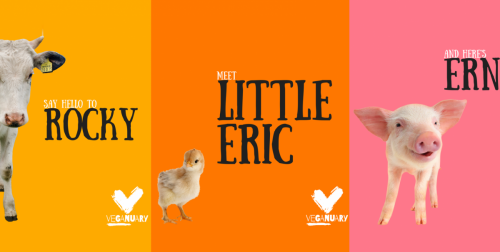In this new blog post, Senior Project Manager Alice Hesmondhalgh interviews 3 of our foodie experts from fusion learning ltd and our sister agency CHILLI UK to unearth their insights on the plant-based category.
Plant-based brands and products are no longer niche propositions. Throughout the last few years we’ve witnessed a significant gravitation towards plant-based lifestyles and consumption*.
In particular, the dairy and meat categories have accelerated their plant-based innovation, from the development of an oat-based milk, to an entire Plant Kitchen range by Marks and Spencer, to a lab grown burger.
Yet there is still an opportunity to encourage more consumers to consider this lifestyle and diet shift.
Alpro have created a day to encourage people to eat more foods derived from plant sources, otherwise known as Plant Power Day. To mark the occasion our foodie specialists from fusion learning and our sister agency Chilli tell us their thoughts on what brands can do to encourage consumers to try plant-based products and much more.
*11% increase in household penetration from 2015 to 2018
First up, why do you think the category has seen such significant increase?
Sarah Williamson (Client Director, fusion learning): People have become so much more knowledgeable in recent years about the importance of eating less refined foods like sugar and white flour, eating less red meat and choosing more fruit, vegetables, whole grains and seeds. For most people, eating more plants is a fairly easy adjustment to make to their current diet that is good for their health, their waistline and the planet. For those of us who are not already vegetarian or vegan it feels like a great shortcut to a healthier lifestyle – without too much of a drastic change or commitment.
Ed Steele (Senior Strategist, Chilli): Plant-based products help consumers to address several needs simultaneously in an easy way. 85% of shoppers are looking to improve their diet* and eating more fruit and veg is the most common way that people are seeking to do this. As plant-based products are also in convenient formats, it’s easy for people to add more and different vegetables into their diet without having to learn what to do with an aubergine! Also, people are of course seeking to reduce their meat intake as well. According to the Waitrose Food and drink report up to 1/5 of UK adults have reduced the amount of meat they eat. This is again mainly for health reasons but replacing meat with plant-based products also allows them to feel they are doing something towards reducing their environmental impact and improving animal welfare. *IGD – Portion size – exploring shopper behaviour and use of nutrition labels Feb 2019
Caroline Cutress (Brand Mentor, fusion learning): Many factors have come together to catalyse the growth of the broad “plant-based” eating way of life. Consumers have unprecedented access to information about nutrition to help them manage their health. There is a growing willingness to take responsibility for our own health. Consumers are looking for positive goodness from a range of hero ingredients that deliver a health benefit by being included or excluded. The trend is for it to be less about a particular diet but more a way of life. The environmental and ideological dimension continues to be a driver for some. But, in my opinion, it is the broader holistic approach and a desire to lead a healthier life through better nutrition that has led to the growth of the plant-based diet.
So, which brands do you think have driven this?
Sarah: Deliciously Ella stands out as a brand which has successfully transformed people’s perceptions of a plant-based diet and brought easy recipes as well as plant-based foods to millions. Because the brand started very small, with one young person’s personal journey to getting her health and her life back, it is authentic and real. It’s grown from a simple blog to recipe books, an app, a deli, an online community and packaged food. Plant-based milks (made from nuts, oats, rice or coconuts) from brands such as Rude Health also seem to have made a huge impact as people are choosing them as a dairy free and clean-label alternative for baking and making smoothies or sauces with. Once only available in health food shops, consumers can now find a very wide range of plant-based milks in their local supermarket.
Ed: As a well-known brand, Quorn’s move towards positioning itself as an everyday food by focusing on flavour and enjoyment rather than health will have done a lot to normalise meat alternatives. The growth they have experienced in recent years shows that this strategy is working. Bol is a brand that offers exciting and innovative flavours and celebrates plants in a way that doesn’t make picking up one of their products feel like a compromise. Retailers are also keeping close pace with brands in this category through launching ranges such as Wicked Kitchen in Tesco and Waitrose’s own-label vegan range.
Caroline: The categories that have encouraged the growth of plant-based consumption are driven by influencers and ingredients, as much as brands. Influencers such as Joe Wicks and Deliciously Ella have successfully managed to shape the category. Both might have started with a health positioning but soon their motive became more about enjoyment. Awareness has extended beyond an understanding of plants being good for you (i.e. 5 fruit and veg a day), to the specific health benefits each one of those fruits and vegetables can bring to the plate. These hero ingredients are driving growth as much as individual brands. An example is kale as a new superfood, sweet potato, and goji berries which all now have mainstream appeal.

Looking into the future, do you think the category is here to stay?
Sarah: Yes! We know consumers want to eat more healthily – but dieting has really sad connotations, and nothing about weight management sounds abundant or delicious. There is a huge opportunity for more brands to provide recipes, food & drink, inspiration, meal planning, restaurants and events to help consumers fall in love with plant-based eating and feel better – just like Ella has done so successfully. We have already seen growth in veganism and vegetarianism over recent years with 1 in 8 Britons now identifying as vegetarian or vegan. I think we will continue to see huge growth in plant-based eating, driven by people eating more plants and less meat and dairy products in a very flexible and individual way, to suit their lifestyle.
Ed: There have been regular news pieces on the possible health implications of eating lots of meat and the impact of its production on the environment. In addition, we have seen campaigns such as Veganuary highlighting potential welfare issues for livestock. The public conversation about eating more plants has therefore never been at a higher level. The appetite for healthy, easy meal solutions won’t go away. There are a lot of plant-based products being launched at the moment, particularly meat replacements, and it will be interesting to see which are successful. However, plant power overall doesn’t look like a flash in the pan.

Caroline: With 1 in 5 UK adults stating that they are following flexitarian diets or reducing the amount of meat they eat (Waitrose research November 2018). Younger consumers may never experience the Sunday roast lunch of past times!!! The definition of the category will change. I think plant- based will blur to include new protein sources.
Thinking of the consumer, what could plant-based brands do to encourage consumers to try their products?
Sarah: Plant-based brands need to pay attention to the same factors that drive success for all food and drink brands – they need to be delicious, convenient, easily available and priced appropriately. In addition, they will attract mainstream consumers if they offer familiarity – using ingredients people know and recognise so they are seen as appealing and acceptable ‘swaps’. They already have a huge advantage as plant-based food and drinks are so often colourful, nutritious and with an ethical story – not to mention instagrammable!

Ed: I think it’s about making consumers forget that a meal doesn’t contain meat by celebrating the variety, colours and flavours that plants can deliver. Make plants exciting. It’s not like eating vegetables is a new thing but the traditional view is that they are a sideshow to the main event of meat or fish. I think Bol are doing this really well.
Caroline: My biggest tip would be – don’t compromise on taste to deliver plant-based. We know that consumers in a foodie driven media savvy world, simply won’t compromise on the enjoyment.
Finally, who do you think is the plant-based brand to watch in the next 3 years?
Sarah: It will be very interesting to follow the fortunes of plant based ‘fast food’, ready meal and meal kit brands whose offers stretch way beyond the veggie burger. Brands such as allplants, (the UK based plant powered frozen meal delivery service) and purple carrot (the US plant-based meal kit service – with funding from Del Monte) are riding on the increasing popularity of meal kits and meal delivery services and making it exceptionally easy for consumers to include more plants in their diets.
Ed: Beyond Meat has been a sensation in the USA and launched in the UK at the end of 2018. It will be a real test to see if a plant-based product that is overtly positioned as a meat replacement (that delivers all the same eating experience as a meat burger) can take a chunk of meat sales.

Caroline: Similarly to Ed, I think there is a growing space for meatless meat or, as I like to call it, faux foods! There has been significant investment in new corporations developing faux foods. Bill Gates and other wealthy investors have invested $108 million in Impossible Foods, a food company start-up that is looking to make meat products with no cholesterol, no antibiotics, no hormones and most surprisingly, no meat. But the California based group is not looking to make veggie burgers, at least not in the traditional sense. It is attempting to create meat products that are so overwhelmingly meaty and flavourful that not even the most enthusiastic meat lover could tell the difference. A great opportunity for those ideologically anti meat consumers who miss the taste and textures of real meat.
We hope you have enjoyed diving into this topic with us! If you’d like to chat plant-based food and drink – or any other trends – please get in touch!